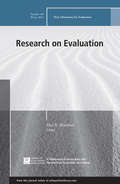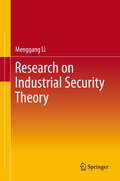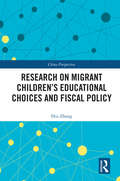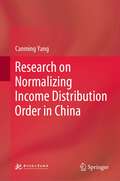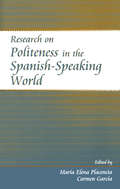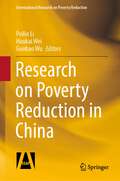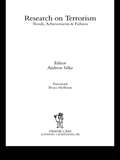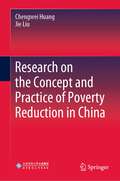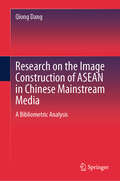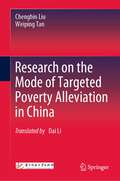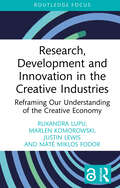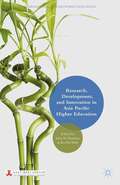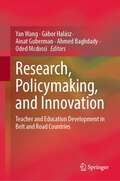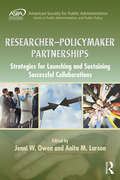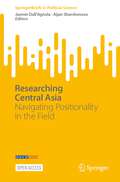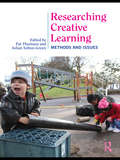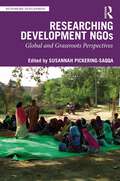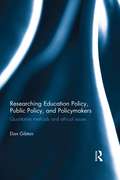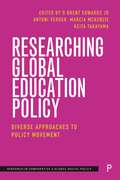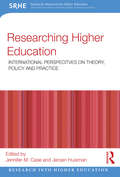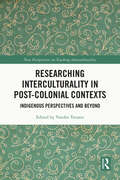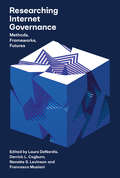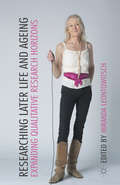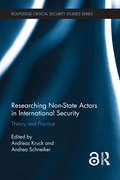- Table View
- List View
Research on Evaluation: New Directions for Evaluation, Number 148 (J-B PE Single Issue (Program) Evaluation)
by Paul R. BrandonThis issue broaden the field’s understanding of Research on Evaluation (RoE) in practice, with a focus on empirical RoE. Considering the full collection of RoE studies, it defines RoE as systematic empirical inquiry resulting in original findings or in reexaminations of existing data about the practice, methods, or profession of program evaluation. RoE inquiries address: the inputs into evaluations, the contexts within which evaluations are conducted, the full range of methods and activities of evaluations, evaluation’s proximal or distal effects, or the professional issues that evaluators encounter. The inquiries include case studies, reflective narratives, studies about evaluation methods, literature reviews, oral histories, bibliometric studies, meta-evaluations, experiments, longitudinal studies, simulations, and time-series studies.This is the 148th issue in the New Directions for Evaluation series from Jossey-Bass. It is an official publication of the American Evaluation Association.
Research on Industrial Security Theory
by Menggang LiThis book offers a systematic discussion and explanation on what industrial security is, what the influencing factors of industrial security are, how industrial security should be evaluated and how early warnings should work from the viewpoint of developing countries. Studying theories of industrial security is necessary for the development of industrial economics theory, innovations in industrial economy studies, and an important supplement to and improvement on the theories of industrial economics. Also, studying industrial security theories can offer valuable guidance for the practice of industrial economics and national industrial policy making.
Research on Migrant Children’s Educational Choices and Fiscal Policy (China Perspectives)
by Hui ZhangDrawing from global insights and the education supply and demand theory, this book investigates migrant children’s education in China, as well as the educational financial policies, which serves as both a background and possible solutions. From a comparative perspective, the education fiscal policies regarding issues with migrant/immigrant students and inequality in the United States and Europe were first examined, before comprehensive theoretical framework is constructed to evaluate the government and public schools’ input and migrant children’s educational demand in China. Their school choices, academic performances, educational choices and impact factors from the perspectives of class, gender, society and family are then discussed in depth. By tracing back to previous fiscal policies regarding migrant children in China and local policies in Beijing, Shanghai, Guangzhou and Shenzhen, the author further interrogates the existing challenges, possible strategies and solutions. This book will appeal to scholars of education economics, education policy, educational equality and those who're generally interested in Chinese education and society.
Research on Normalizing Income Distribution Order in China
by Canming YangThis book systematically studies income distribution order by exploring corruption, political power, labor-capital relation, and recessive economic problems. By categorizing various incomes, the connotation of "income distribution order" is clearly defined, and the income distribution pattern and the formation mechanism of income distribution are studied. Based on a new perspective, this book features the in-depth analysis of reasons for the chaotic income distribution order and naturally derives solutions to standardize the income distribution order. The research method used in this book pays special attention to field research and multidisciplinary comprehensive research method. This study obtains first-hand data through three large-scale household income questionnaire surveys nationwide, through which the income gap between urban and rural areas, different regions, industries, and different income groups in China is measured. Based on this data, the study also analyzes the influence of different factor endowments on residents' income and studies the contribution of these factor endowments to income gap, which contributes on the policy recommendations to narrow the income gap.
Research on Politeness in the Spanish-Speaking World
by María Elena Placencia Carmen GarcíaOne of the main contributions of this important book is that it offers a thorough survey of the theoretical and empirical developments that have occurred in the area of (im)politeness in the different regions of the Spanish-speaking world, gathering together overviews by distinguished scholars. Additionally, the book advances the field with new empirical research on linguistic (im)politeness, and silence and (im)politeness, in a range of (non)institutional contexts, as well as new perspectives for the study of (im)politeness. A closing chapter by the editors provides an assessment of salient trends in the area and directions for future research.Research on Politeness in the Spanish-Speaking World is essential reading for students in Spanish pragmatics and Spanish linguistics, sociolinguistics, and discourse analysis. The volume is also very useful to English-speaking scholars in the general field of pragmatics who are not proficient in Spanish but require access to these empirical studies.
Research on Poverty Reduction in China (International Research on Poverty Reduction)
by Peilin Li Houkai Wei Guobao WuThis book identifies “development-oriented poverty reduction” as a crucial part of what is now often billed as China’s unique development path, experience and model. China’s success serves as an example for any society aiming to eradicate poverty. However, there is still a tough road ahead as the country enters a new phase of the war on poverty.In addition to a systematic overview of the country’s development-oriented poverty reduction experiences over recent decades, the book also offers an outlook for poverty reduction in the coming years, including challenges the country will face as it enters the final stretch in the race to achieve moderate prosperity for all. It also discusses policy options for meeting the government’s poverty-reduction targets by 2020 within the precision-targeting strategy framework.
Research on Terrorism: Trends, Achievements and Failures (Political Violence Ser.)
by Andrew SilkeThis book brings together leading international experts in the world of terrorism research and counterterrorism policy-making. It has three clear areas of focus:it looks at current issues and trends in terrorism researchit explores how contemporary research on terrorism is focused and conductedit examines how this research impacts in terms of count
Research on the Concept and Practice of Poverty Reduction in China
by Jie Liu Chengwei HuangFrom both theoretical and practical perspectives, this book systematically expounds the important theories, key measures and major achievements in the field of poverty alleviation in China, and sums up the important experience of poverty alleviation, it answers the significant question why China has been able to lift itself out of poverty and build a moderately prosperous society in an all round way. China has accumulated experience for achieving the two centenary goals, and contributed Chinese wisdom and Chinese solutions to the global cause of poverty reduction.
Research on the Image Construction of ASEAN in Chinese Mainstream Media: A Bibliometric Analysis
by Qiong DangThe book offers an in-depth analysis of how ASEAN (Association of Southeast Asian Nations) is portrayed in the Chinese media, focusing on the multifaceted dynamics of economic cooperation, regional connectivity, cultural exchange, and non-traditional security governance. With the rise of China's global influence, understanding the strategic role ASEAN plays in this complex relationship has never been more critical. The book explores ASEAN&’s image as a cooperative, open, and innovative economic partner, examining digitalization, cross-border synergy, regional trade hubs, and infrastructure collaborations. It delves into how the region&’s growing role as a technological and green-transition hub enhances its position in global trade networks, offering valuable insights for scholars, policymakers, and business leaders. Key chapters highlight ASEAN as an emerging key player in logistics, air freight, and rail transport, focusing on vital trade corridors like Vietnam and the strategic cooperation between regions such as Chongqing, Yunnan, and Guangxi. It also showcases ASEAN&’s importance as a cultural bridge, highlighting the region&’s active role in tourism, cultural heritage preservation, and educational exchanges. A special emphasis is placed on ASEAN's involvement in non-traditional security cooperation, including its resilience against natural disasters and growing cybersecurity challenges. The book also underscores ASEAN&’s importance as a host and participant in major international sporting events, contributing to its growing global profile.Combining scholarly research with practical insights, this work provides readers with a comprehensive understanding of ASEAN&’s image construction in Chinese media, illustrating how ASEAN is not just a regional grouping but a pivotal player in shaping the future of international relations, trade, and cooperation.
Research on the Mode of Targeted Poverty Alleviation in China
by Chengbin Liu Weiping TanThis book conducts systematic theoretical research on the social mechanism running system based on China's targeted poverty alleviation model and poverty reduction experience. In light of the theories of Parsons’ structural functionalism, Luhmann’s social system theory, and Merton's structural functionalism, this book puts forward the "coupling" theory of China's targeted poverty alleviation strategy. From the theoretical level, the operation process of poverty reduction policy is a complex social system. The "coupling" theory of China's targeted poverty alleviation strategy is mainly a theoretical innovation for the general expression of China's targeted poverty alleviation model. In terms of the design and running process of the targeted poverty alleviation strategy, the multilevelness of antipoverty and the heterogeneity of poverty objects reflect the complexity of poverty reduction, which displays systematic complexity in the structural evolution and functional differentiation of poverty reduction, as well as the evolution of the subjective intention of poverty objects. Therefore, this book conducts a "systematic" analysis of the implementation conditions and operation process of targeted poverty alleviation from the perspective of "coupling," presenting a social practice mechanism in which multiple systems coordinate and interact with each other, the poverty reduction system is continuously optimized, and policy effectiveness is continuously improved in China's poverty reduction practice.
Research, Development and Innovation in the Creative Industries: Reframing Our Understanding of the Creative Economy (Routledge Focus on the Global Creative Economy)
by Ruxandra Lupu Marlen Komorowski Justin Lewis Máté Miklos FodorWhat does effective research and development look like in the creative industries and how might it lead to successful innovation? This book is an answer to that question.Building upon place-based creative industry research, the book focuses on evidence from the media sector, while encompassing a range of creative practices, from digital tourism to dance. Leveraging unique empirical data from the Welsh creative industries, the authors map a series of pathways for creative businesses. In so doing, the book offers new frameworks for assessing innovative practice and highlights options for tailored institutional funding.Channelling research insights, this shortform book helps researchers, policy-makers and reflective practitioners to understand how to deliver effective strategies for the creative sector.The Open Access version of this book, available at www.taylorfrancis.com, has been made available under a Creative Commons Attribution-Non Commercial-No Derivatives (CC-BY-NC-ND) 4.0 license.
Research, Development, and Innovation in Asia Pacific Higher Education
by Ka Ho Mok John N. HawkinsResearch, Development, and Innovation in Asia Pacific Higher Education critically examines recent policies and practices adopted by governments and universities in Asia Pacific in promoting research and development, innovation, and entrepreneurial activities between the universities, industry and business. Critical reflections upon the changing relationship among these stakeholders are offered, with comparative perspectives and international insights into how universities in Asia Pacific have handled the growing pressure for top university rankings and keen competition in the knowledge-based economy.
Research, Policymaking, and Innovation: Teacher and Education Development in Belt and Road Countries
by Yan Wang Ainat Guberman Gábor Halász Ahmed Baghdady Oded McdossiThis book presents an update on teacher and education development research, policymaking and innovation within the Belt and Road Countries. It illustrates cases from 18 Belt and Road countries: Albania, Cambodia, China, Hungary, India, Israel, Kazakhstan, Kyrgyzstan, Lithuania, Malaysia, Mongolia, Qatar, Russia, Singapore, Sri Lanka, Syria, Tajikistan and Turkey. It identifies regularities and patterns of teacher development in the context of education development, and explores the characteristics of education policy and practice of the Belt and Road countries. It will be of interest to all researchers, educators and policymakers involved in teacher development and/or education development.
Researcher-Policymaker Partnerships: Strategies for Launching and Sustaining Successful Collaborations (ASPA Series in Public Administration and Public Policy)
by Jenni W. Owen Anita M. LarsonGone are the days when researchers, policymakers, and practitioners each worked in isolation. In recent years, a few interrelated issues have emphasized the need for greater collaboration among these groups: the increased emphasis on results and accountability (particularly where public funds are at stake), the need to improve services, and the growing use of technology. This book is about these all-important partnerships, specifically the relationships between those searching for evidence and those putting evidence to use, designing and implementing policy at the federal, state, or local level. Yet the science or art of how to create partnerships and how to make them work has just begun. This book offers the reader a toolkit for effective researcher/policymaker collaborations by exploring innovations underway around the country and developing an analytic framework to describe the process. It asks questions such as: What can we learn from these examples? How can and should partners communicate? Where should partners plan together, and where is it best to leave some separation to respect the differences in our roles? Through carefully chosen and organized case studies, this book demonstrates the motivations that lead to partnerships, the core elements of successful implementation, and the lessons to be learned about sustaining these relationships. It further examines the use of research once the research phase has concluded, as well as the ever-important consideration of investing in collaboration by both non-profit and public sector funders. For policymakers, this book offers a greater appreciation of the role of research in the policy process and new insights into different types of research. For researchers, the book provides insights into how best to formulate questions, how to work closely with those most affected, and how to communicate findings in ways that can be more easily understood by those who are depending on clear answers. Students of public policy, public administration, social work, and education will find much to inform future roles in research, policy or practice.
Researching Central Asia: Navigating Positionality in the Field (SpringerBriefs in Political Science)
by Aijan Sharshenova Jasmin Dall’AgnolaThis open access book explores some of the struggles and challenges that researchers and practitioners face when conducting research in the Central Asian research setting. Written for scholars still in the planning stages of their research, it addresses key questions, including: How shall we problematize and reconceptualize the concept of positionality through lenses of local voices from the region? How does practitioners’ and scholars’ positionality contribute to their experiences of inclusion, exclusion, and access to the field? How do scholars navigate issues of personal safety and mental well-being in the more closely monitored societies of Central Asia? The book includes contributors from both Central Asia and Western countries, paying particular attention to the ways researchers’ subjectivity shape how they are received in the region, which, in turn, influences how they write about and disseminate their research. In featuring an even greater variety of voices, this book fills an important gap in the literature on field research and knowledge production in and on Central Asia.
Researching Creative Learning: Methods and Issues
by Julian Sefton-Green Pat ThomsonIt is a common ambition in society and government to make young people more creative. These aspirations are motivated by two key concerns: to make experience at school more exciting, relevant, challenging and dynamic; and to ensure that young people are able and fit to leave education and contribute to the creative economy that will underpin growth in the twenty-first century. Transforming these common aspirations into informed practice is not easy. It can mean making many changes: turning classrooms into more exciting experiences; introducing more thoughtful challenges into the curriculum; making teachers into different kinds of instructors; finding more authentic assessment processes; putting young people’s voices at the heart of learning. There are programmes, projects and initiatives that have consistently attempted to offer such change and transformation. The UK programme Creative Partnerships is the largest of these, but there are significant initiatives in many other parts of the world today, including France, Norway, Canada and the United States. This book not only draws on this body of expertise but also consolidates it, making it the first methodological text exploring creativity. Creative teaching and learning is often used as a site for research and action research, and this volume is intended to act as a textbook for this range of courses and initiatives. The book will be a key text for research in creative teaching and learning and is specifically directed at ITE, CPD, Masters and doctoral students.
Researching Development NGOs: Global and Grassroots Perspectives (Rethinking Development)
by Susannah Pickering-SaqqaThis book offers a critical insight into how the study of NGOs can be more theoretically grounded and methodologically creative. The role of NGOs in global development has been the focus of considerable research and scholarship for the last four decades. More recently, scholars and NGO practitioners have begun to explore their relationships and how research can better inform practice and vice versa. This book addresses questions arising from such research, including: how different theoretical perspectives can be applied to the study of NGOs; what kinds of data can be used when trying to better understand NGOs; and what methods can be used in studying NGOs. Rather than evaluating the impact of NGO work, this is a book about how researchers and practitioners can better understand what NGOs do and how they operate. Bringing together work from a range of NGO researchers working across diverse disciplines and at varied stages of their academic careers, the collection is supported by recent case studies in the field as well as ‘dilemma boxes’ and discussion questions in every chapter. As such, Researching Development NGOs is an essential resource for postgraduate students of Research Methods in Development Studies, NGOs and Development Management as well as practitioners wanting to find out more about the sector.
Researching Education Policy, Public Policy, and Policymakers: Qualitative methods and ethical issues
by Dan GibtonResearching Education Policy, Public Policy, and Policymakers is a theoretical and hands-on practical guide to conducting qualitative research on education policy and public policy, with an emphasis on studies that involve senior participants and high-status government and non-government organisations. Building on over a decade of extensive experience in qualitative research on education policy among the most senior policymakers, this book explores and illustrates successful approaches to working with senior policymakers through examples from both the UK and Israel. Whilst policy studies are traditionally either theoretical or quantitative, this book explains the theory, methodology, and ethics of harnessing qualitative methods to the study of senior policymakers and their settings. Key topics include: Designing and planning the qualitative policy study Document analysis as a policy research tool Interviewing policymakers and observing policy Mapping qualitative policy analysis methods Writing policy reports Ethics and trust This practical guide, built upon a sound theoretical framework, will prove both inspirational and helpful to academic and professional researchers across all disciplines involving public policy.
Researching European Security Integration (The European Union in International Affairs)
by Kamil ZwolskiThis book provides new and established researchers with innovative methodologies and research strategies to explore European security integration from a different perspective, challenging traditional theoretical interpretations. It takes a step back from well-established theoretical approaches to the European Union’s (EU) Common Foreign and Security Policy (CFSP) and Common Security and Defence Policy (CSDP) to ask more fundamental questions about the core assumptions underpinning research on European security integration. It supports methodological innovations with an analysis of the most significant empirical problems of European security governance, including the war in Ukraine or the role of Russia in European security. In the last chapter, the author offers ideas for new pedagogical approaches to teaching European Studies.
Researching Global Education Policy: Diverse Approaches to Policy Movement (Research in Comparative and Global Social Policy)
by Kerstin Martens Michael Windzio Laura Engel Kalervo N. Gulson Nelli Piattoeva Andrew Wilkins Steven Lewis Emiliano Grimaldi Clara Fontdevila Dennis Niemann Fabian Besche-Truthe Jordi Collet Mellisa Chin Yasin Tunc Jisun Jeong Oshie Nishimura-Sahi Gerard Ferrer-Esteban Chenyu Wang Brad Gobby Andreu Termes Tomas Esper Marcel Pagès Oscar ValienteThe movement of policy is a core feature of contemporary education reform. Many different concepts, including policy transfer, borrowing and lending, travelling, diffusion and mobility, have been deployed to study how and why policy moves across jurisdictions, scales of governance, policy sectors or organisations. However, the underlying theoretical perspectives and the foundational assumptions of different approaches to policy movement remain insufficiently discussed. To address this gap, this book places front and center questions of theory, ontology, epistemology and method related to policy movement. It explores a wide diversity of approaches to help understand the policy movement phenomena, providing a useful guide on global studies in education, as well as insights into the future of this dynamic area of work.
Researching Higher Education: International perspectives on theory, policy and practice (Research into Higher Education)
by Jennifer M. Case and Jeroen HuismanResearch on higher education has yielded many insights that have improved our theoretical and practical understanding but there are still many themes that continue to appear on research agendas, provoking renewed focus on these complex questions and problems. Researching Higher Education explores these issues, examining topics such as equity in access and participation, the relationship between higher education and society, how and what students learn and the professional development of academics. In this volume, contributors from Europe, Australia, Africa and the US critically address ongoing issues with a set of key questions to guide their analysis: What do we know? What are the missing links and gaps in past research? What are the implications for further research? Key themes include: The nature of higher education Higher education and society Staff and students in higher education Teaching and learning Curriculum and assessment Critical, engaging and international in scope, Researching Higher Education will be a valuable guide for academics, researchers, postgraduate students and policy makers in the higher education community.
Researching Interculturality in Post-Colonial Contexts: Indigenous Perspectives and Beyond (New Perspectives on Teaching Interculturality)
by Vander TavaresThis volume critically explores intercultural "encounters" between Indigenous and Eurocentric education in the post-colonial contexts of Brazil, Chile, and Mexico.In this book, interculturality in education is considered in a variety of educational and social settings, including teacher, community, secondary, and higher education, as well as language revitalization efforts, from a wide range of analytical and methodological perspectives. The contributors examine historical and emerging challenges in initiatives to expand or redesign education through interculturality/ies, highlighting the work that remains on the educational agenda while also identifying obstacles perpetuated by ideologies of monoculturalism, neoliberalism, and capitalism. Several case studies are presented to showcase pedagogical creativity, curricular innovation, and epistemological plurality in intercultural education and research. The volume also includes two expert transcultural commentaries that approach the challenges and opportunities in a comparative way, drawing on Indigenous perspectives beyond the three countries studied. This book argues for a critical and decolonial engagement with interculturality (in) education and research, emphasizing ethical collaboration, diverse worldviews, and resistance to epistemic singularity.This book will be essential for scholars and students of intercultural studies, education, and decolonization. It also provides valuable insights for educators navigating intercultural and Indigenous education.
Researching Internet Governance: Methods, Frameworks, Futures (Information Policy)
by Laura DeNardis, et al.Scholars from a range of disciplines discuss research methods, theories, and conceptual approaches in the study of internet governance.The design and governance of the internet has become one of the most pressing geopolitical issues of our era. The stability of the economy, democracy, and the public sphere are wholly dependent on the stability and security of the internet. Revelations about election hacking, facial recognition technology, and government surveillance have gotten the public's attention and made clear the need for scholarly research that examines internet governance both empirically and conceptually. In this volume, scholars from a range of disciplines consider research methods, theories, and conceptual approaches in the study of internet governance.
Researching Later Life and Ageing: Expanding Qualitative Research Horizons
by Miranda LeontowitschThis collection on researching later life and ageing critically reflects upon the qualitative methods used in gaining knowledge of under-researched groups of older people and sets out future research agendas.
Researching Non-state Actors in International Security: Theory and Practice (Routledge Critical Security Studies)
by Andrea Schneiker Andreas KruckThis volume provides researchers and students with a discussion of a broad range of methods and their practical application to the study of non-state actors in international security. All researchers face the same challenge, not only must they identify a suitable method for analysing their research question, they must also apply it. This volume prepares students and scholars for the key challenges they confront when using social-science methods in their own research. To bridge the gap between knowing methods and actually employing them, the book not only introduces a broad range of interpretive and explanatory methods, it also discusses their practical application. Contributors reflect on how they have used methods, or combinations of methods, such as narrative analysis, interviews, qualitative comparative analysis (QCA), case studies, experiments or participant observation in their own research on non-state actors in international security. Moreover, experts on the relevant methods discuss these applications as well as the merits and limitations of the various methods in use. Research on non-state actors in international security provides ample challenges and opportunities to probe different methodological approaches. It is thus particularly instructive for students and scholars seeking insights on how to best use particular methods for their research projects in International Relations (IR), security studies and neighbouring disciplines. It also offers an innovative laboratory for developing new research techniques and engaging in unconventional combinations of methods. This book will be of much interest to students of non-state security actors such as private military and security companies, research methods, security studies and International Relations in general.
